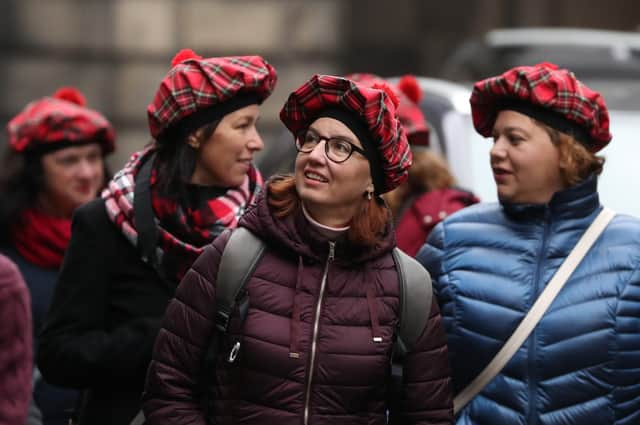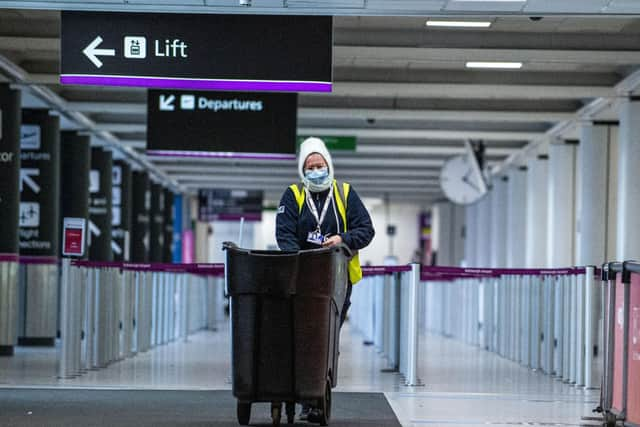Edinburgh's tourism industry is serious jeopardy and needs more help to survive – Donald Emslie


The debate over tourism is a distant memory. As the industry plans for recovery, we must guard against the belief of some that the success of the past will automatically lead to the return of visitors to our beautiful, historic city.
Many things have changed, such as visitor behaviour and sentiment, travel connections and the visitor experience itself. As a result, Edinburgh will have to fight even harder to attract these visitors back. We face fierce competition from every other city in Europe for this £2 billion of income from the four million visitors to our city in 2019.
Advertisement
Hide AdAdvertisement
Hide AdThe facts make stark reading. Of just over 27 million annual bed nights spent by international tourists in Scotland, 47 per cent of them are in Edinburgh. Likewise, the city benefits from just under half of the total spend by international tourists in Scotland. Sixty-six per cent of overseas visitors say Edinburgh is their key destination.
Recent announcements from the First Minister indicate the wider economy is scheduled to open towards the end of April. Along with a clear message not to travel, the tourism sector across Scotland faces another period of low activity and continued financial pressure. Many businesses will not survive.
With almost a year of closures and restrictions, the pandemic has had a devastating effect on the capital. The grim reality of the issues at hand can be seen by a short walk through the city centre or the Old Town and also in the most recent statistics comparing 2020 with 2019.
Footfall in the city centre was down 66 per cent, Edinburgh Airport passenger numbers were down 76 per cent, the Visit Scotland information centre dropped 87 per cent, hotel occupancy was down 58 per cent, and our tourist attractions suffered a 76 per cent drop in numbers. In January, lockdown meant retail sales in the city centre were down 95 per cent and hospitality sales dropped by 97 per cent compared to 2019 figures. All told this is a reduction of over £1bn in visitor expenditure in the city.


What we must not forget is the effect on residents’ jobs with the losses far outweighing the rest of the country and the latest claimant count up 148 per cent; the count for 18 to 24-year-olds across the Edinburgh city region increased from 4,400 in February 2020 to 8,865 in December 2020. Tourism, retail, and hospitality have a disproportionally large number of young workers in employment and without them, the city faces an even larger youth unemployment problem.
The sectorial support has been very welcome and has allowed the majority of businesses to garner some financial assistance. However, this support has not differentiated between the needs of the cities and more rural tourism businesses.
Edinburgh tourism has been disproportionally hit by the pandemic and support for the tourism sector must in part be seen through a city lens, with longer term strategic support to combat the more complex issues facing cities.
Why is this required? We have seen a catastrophic reduction in short-term air travel into the city, and all assumptions are that forward bookings from international visitors will not return to anything resembling pre-Covid numbers for several years, if at all.
Advertisement
Hide AdAdvertisement
Hide AdThis will have a knock-on effect on business tourism through conferences and corporate meetings as well as leisure travel for city breaks. Tourism and its associated sectors will therefore be facing challenges for a considerable time and be required to change focus towards different sectors of the market.
Last summer we saw Scots preferring to go on holidays and short breaks in the more rural or seaside settings. This had a positive impact on many places, but the opposite effect on cities. People made the conscious decision to stay away from large conurbations.
Etag, and our sister organisations in Glasgow, Dundee and Aberdeen are lobbying for increased support to recognise this disparity. This should not be to the detriment of more rural tourism but cognisant of the different economic scale.
What would support for cities look like?
Firstly, cities need to be recognised as key drivers and gateways of Scottish tourism, especially our capital city. If Edinburgh recovers to any degree, the whole country will benefit from visitors spreading throughout Scotland.
Cities will need specific marketing and promotional support to drive demand from domestic and international visitors, encouraging them to return as soon as it is safe to do so.
Further funds will be needed to develop innovation around new products and ways of operating to meet the changing visitor demands and for the delivery of the 2030 Edinburgh Tourism Strategy. Through this strategy, Edinburgh has the chance to become an exemplar for responsible and sustainable tourism, ensuring the visitor economy returns better than it was pre-pandemic and is respectful of people, place and planet, the strategy’s core streams.
How quickly Edinburgh’s tourism industry can recover will be fundamental to the economic recovery of the city and its aviation, tourism, retail, and hospitality sectors. It is imperative it receives the necessary support and that a sensible and deliverable plan is in place.
Importantly, we should not believe that Edinburgh will be OK and simply assume the tourists will return. They might, but they might not, and we cannot run the risk of not supporting such a critical part of the city’s economy.
Advertisement
Hide AdAdvertisement
Hide AdThe success of tourism has contributed to development in our city and significant growth in the economy. Our tourism industry contributes greatly to our dynamic and vibrant city, and the services and venues available to residents.
If we act now and are ambitious and forward-thinking, we can recover from this perilous position and see a much better visitor economy emerge which will benefit the whole city and all its residents.
Donald Emslie is chair of Edinburgh Tourism Action Group (Etag)
A message from the Editor:
Thank you for reading this article. We're more reliant on your support than ever as the shift in consumer habits brought about by coronavirus impacts our advertisers.
If you haven't already, please consider supporting our trusted, fact-checked journalism by taking out a digital subscription.
Comments
Want to join the conversation? Please or to comment on this article.